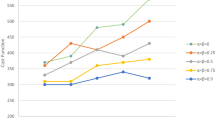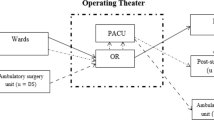Abstract
Operating room schedules are regularly influenced by uncertain demands such as unknown surgery durations or randomly arriving emergency patients. The performance of these schedules depends on the information available about these uncertainties when designing the schedules. We focus on an offline operational planning level which assigns patients to days and rooms without focusing on the intra-day sequence. A sufficient amount of time per day is to be reserved for elective and emergency surgeries. At the same time we observe that the performance of a particular schedule influences several stakeholders’ interests. We therefore combine the aspects of uncertain planning parameters and multiple stakeholders’ interests and investigate the performance of schedules for operating rooms using a dedicated robust multi-criteria optimisation approach. We compute a robust compromise schedule focusing on stochastic surgery times and different objectives and simultaneously reserve time windows dedicated to randomly arriving emergency demand. In order to evaluate the schedule’s quality, we perform an extensive simulation study and demonstrate to what extent each robust schedule achieves the mentioned goals. In a second step, we perform a sensitivity analysis in order to investigate how significant changes in assumptions about the stochastic model parameters affect the level of achievement of the different objectives.







Similar content being viewed by others
References
Bertsimas, D., & Sim, M. (2004). The price of robustness. Operations Research, 52(1), 35–53.
Bibi, Y., Cohen, A. D., Goldfarb, D., Rubinstein, E., & Vardy, D. A. (2007). Intervention program to reduce waiting time of a dermatological visit: Managed overbooking and service centralization as effective management tools. International Journal of Dermatology, 46(8), 830–834.
Cardoen, B., Demeulemeester, E., & Beliën, J. (2010). Operating room planning and scheduling: A literature review. European Journal of Operational Research, 201(3), 921–932.
Cayirli, T., & Veral, E. (2003). Outpatient scheduling in health care: A review of literature. Production and Operations Management, 12(4), 519–549.
Diaby, V., Campbell, K., & Goeree, R. (2013). Multi-criteria decision analysis (MCDA) in health care: A bibliometric analysis. Operations Research for Health Care, 2(1–2), 20–24.
Guerriero, F., & Guido, R. (2011). Operational research in the management of the operating theatre: A survey. Health Care Management Science, 14(1), 89–114.
Gülpinar, N., Pachamanova, D., & Çanakoğlu, E. (2013). Robust strategies for facility location under uncertainty. European Journal of Operational Research, 225(1), 21–35.
Hans, E. W., & Vanberkel, P. T. (2012). Operating theatre planning and scheduling. In R. Hall (Ed.), Handbook of healthcare system scheduling, Volume 168 of International Series in Operations Research & Management Science (pp. 105–130). US: Springer.
Hans, E. W., van Houdenhoven, M., & Hulshof, P. J. H. (2012). A framework for healthcare planning and control. In R. Hall (Ed.), Handbook of healthcare system scheduling, International series in operations research & management science (Vol 168, pp. 303–320). USA: Springer.
Kou, G., & Wu, W. (2014). Multi-criteria decision analysis for emergency medical service assessment. Annals of Operations Research, 223, 1–16.
Lamiri, M., Xie, X., Dolgui, A., & Grimaud, F. (2008). A stochastic model for operating room planning with elective and emergency demand for surgery. European Journal of Operational Research, 185(3), 1026–1037.
Marques, I., Captivo, M. E., & Pato, M. V. (2014). A bicriteria heuristic for an elective surgery scheduling problem. Health Care Management Science. doi:10.1007/s10729-014-9305-z
Mehrbod, M., Nan, T., Miao, L., & Wenjing, D. (2012). Interactive fuzzy goal programming for a multi-objective closed-loop logistics network. Annals of Operations Research, 201(1), 367–381.
Meskens, N., Duvivier, D., & Hanset, A. (2013). Multi-objective operating room scheduling considering desiderata of the surgical team. Decision Support Systems, 55(2), 650–659.
M’Hallah, R., & Al-Roomi, A. H. (2014). The planning and scheduling of operating rooms: A simulation approach. Computers & Industrial Engineering, 78, 235–248.
Min, D., & Yih, Y. (2010). Scheduling elective surgery under uncertainty and downstream capacity constraints. European Journal of Operational Research, 206(3), 642–652.
Morton, A. (2014). Aversion to health inequalities in healthcare prioritisation: A multicriteria optimisation perspective. Journal of Health Economics, 36, 164–173.
Mulvey, J. M., Vanderbei, R. J., & Zenios, S. A. (1995). Robust optimization of large-scale systems. Operations Research, 43(2), 264–281.
Rachuba, S., & Werners, B. (2014). A robust approach for scheduling in hospitals using multiple objectives. Journal of the Operational Research Society, 65(4), 546–556.
Strum, D. P., May, J. H., & Vargas, L. G. (2000). Modeling the uncertainty of surgical procedure times: Comparison of log-normal and normal models. Anesthesiology, 92(4), 1160–1167.
van Essen, J. T., Hans, E. W., Hurink, J. L., & Oversberg, A. (2012a). Minimizing the waiting time for emergency surgery. Operations Research for Health Care, 1(2–3), 34–44.
van Essen, J. T., Hurink, J. L., Hartholt, W., & van den Akker, B. J. (2012b). Decision support system for the operating room rescheduling problem. Health Care Management Science, 15, 355–372.
van Oostrum, J. M., Van Houdenhoven, M., Hurink, J. L., Hans, E. W., Wullink, G., & Kazemier, G. (2008). A master surgical scheduling approach for cyclic scheduling in operating room departments. OR Spectrum, 30(2), 355–374.
Wachtel, R. E., & Dexter, F. (2008). Tactical increases in operating room block time for capacity planning should not be based on utilization. Anesthesia and Analgesia, 106(1), 215–226.
Werners, B. (1987a). Interactive multiple objective programming subject to flexible constraints. European Journal of Operational Research, 31(3), 342–349.
Werners, B. (1987b). An interactive fuzzy programming system. Fuzzy Sets and Systems, 23(1), 131–147.
Werners, B. (1988). Aggregation models in mathematical programming. In G. Mitra, H. J. Greenberg, F. A. Lootsma, M. J. Rijkaert, & H. Zimmermann (Eds.), Mathematical models for decision support, Volume 48 of NATO ASI series (pp. 295–305). Berlin: Springer. ISBN: 978-3-642-83557-5.
Wullink, G., Houdenhoven, M., Hans, E. W., Oostrum, J., Lans, M., & Kazemier, G. (2007). Closing emergency operating rooms improves efficiency. Journal of Medical Systems, 31(6), 543–546.
Zhang, B., Murali, P., Dessouky, M., & Belson, D. (2009). A mixed integer programming approach for allocating operating room capacity. Journal of the Operational Research Society, 60(5), 663–673.
Zhao, Z., & Li, X. (2014). Scheduling elective surgeries with sequence-dependent setup times to multiple operating rooms using constraint programming. Operations Research for Health Care, 3(3), 160–167.
Acknowledgments
The authors would like to thank the anonymous referees for their valuable comments on a previous version of this paper. The work of Sebastian Rachuba is also funded by the National Institute for Health Research (NIHR) Collaboration for Leadership in Applied Health Research and Care South West Peninsula at the Royal Devon and Exeter NHS Foundation Trust. The views expressed are those of the author(s) and not necessarily those of the NHS, the NIHR or the Department of Health.
Author information
Authors and Affiliations
Corresponding author
Appendix
Appendix
Rights and permissions
About this article
Cite this article
Rachuba, S., Werners, B. A fuzzy multi-criteria approach for robust operating room schedules. Ann Oper Res 251, 325–350 (2017). https://doi.org/10.1007/s10479-015-1926-1
Published:
Issue Date:
DOI: https://doi.org/10.1007/s10479-015-1926-1




